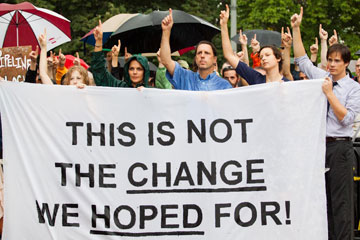A little over a month after 1,252 people were arrested in two weeks of civil action against the Keystone XL Pipeline, The New York Times has revealed that the Obama administration allowed a consulting firm with financial ties to the pipeline to conduct the project’s Environmental Impact Assessment (EIA). While it is not uncommon for government departments to ‘outsource’ EIAs, legal experts quoted in the piece expressed surprise that the State Department would select a firm so close to the company proposing the project.
In fact, the US government asked TransCanada, which is proposing to build the pipeline from Alberta’s tar sand to Texas refineries, for names of firms to handle the ESA. At the top of the company’s list was Cardno ENTRIX, an environmental and natural resource management consulting firm, which has a long relationship with TransCanada.
 Activists protest tar sands pipeline through US. Photo by: Ben Powless/Tar Sands Action. |
At the behest of the State Department, Cardno ENTRIX produced three EIA drafts, reports The New York Times. Two of which were heavily criticized by the Environmental Protection Agency (EPA), while the third hasn’t been reviewed by the agency. Environmentalists have criticized the last EIA for not addressing the greenhouse emissions from the tar sands and for allegedly painting a rosy picture of possible oil spills from the pipeline.
Prior to this, critics say emails released under the Freedom of Information Act show an at times cosy relationship between some in the State Department and a lobbyist pushing for the Keystone XL Pipeline.
Climate activists in the US have targeted the Keystone XL Pipeline as a litmus test for the Obama administration’s dedication to fight climate change after years of disappointment. Emissions from the tar sands are significantly greater than from more traditional sources of oil.
Proponents say the $7 billion pipeline will add jobs and bring oil to the US from a friendly neighbor, however critics contend that much of the oil will probably go abroad.
Related articles
Over 100 arrested as tar sands civil disobedience spreads to Canada
(09/27/2011) After two weeks of sustained protesting at the US White House against the Keystone XL pipeline, with 1,252 people arrested, civil disobedience has now spread to Canada, home of the tar sands. Yesterday, around 500 people protested in Ottawa against Canada’s controversial tar sands; 117 were arrested as they purposefully crossed a barrier separating them from the House of Commons in an act of civil disobedience.
Climate test for Obama: 1,252 people arrested over notorious oil pipeline

(09/06/2011) Two weeks of climate disobedience at the White House ended over the weekend with 1,252 people arrested in total. Activists were protesting the controversial Keystone XL pipeline in an effort to pressure US President Barack Obama to turn down the project. If built the pipeline would bring oil from Alberta’s tar sands through six US states down to Texas refineries. While protestors fear pollution from potential spills, especially in the Ogallala Aquifer which supplies water to millions, the major fight behind the pipeline is climate change: Canada’s tar sands emit significantly more carbon than conventional sources of oil.
Over 100 protestors arrested as civil action begins against tar sands pipeline to US
(08/22/2011) In the first two days of a planned two week sit-in at the White House in Washington DC, over 100 activists against the Keystone XL pipeline have been arrested, reports Reuters. If approved by the Obama Administration, the 1,700 mile pipeline would bring around 700,000 barrels of oil daily from Canada’s notorious tar sands to oil refineries in Texas.